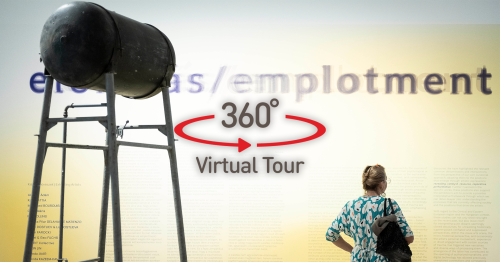The exhibition is open: 13 MAY – 28 AUGUST 2022
This international group exhibition focuses on the adaptation of sources of trauma by means of visual art and a novel analysis of their performative representation. The curators examine how artists’ participation in these processes has changed over the period of the last twenty to thirty years, and what new approaches and perspectives have emerged and come to the fore.
In the last two to three decades, a growing global trend has seen artists exert a greater influence on their immediate social environment through changing artistic practices and new media; indeed, in many cases, artists have gone far beyond the boundaries of the sphere of art to become active shapers and drivers of community life.
The exhibition is primarily conceived as a platform that, instead of showing works that seek to represent traumatic experiences and tragic events, focuses on creative processes that use art as a potential active tool for processing trauma, with an emphasis on the ‘relational aspect’. Referring to art theorist Jill Bennett, the relational aspect has eclipsed the representational and has created a new commitment towards the processing of trauma at the individual and social level. This kind of “empathic vision” allows art not to interpret or repeat the traumatic event, but to provide empathic witnessing, manoeuvring a combination of emotional and intellectual threads at the same time.
The selection presents twenty artists, artist groups and artist duos from thirteen countries. In addition to European artists, it also includes work from scenes rarely put on show in Hungary, such as Cuba, Myanmar and Chile.
The exhibition presents five artistic positions – without seeking to cover all possible stances and give rise to another closed discourse. Adapting to the positions that emerge through artistic expressions, the curators have highlighted common denominators and intersections, thereby outlining aspects of trauma processing that can catalyse, reveal, repair, resource and performatively adapt these sources. The exhibition also addresses issues that are less visible but deeply rooted: the curators have included less obvious sources of trauma in the concept, emphasising the everyday aspects of trauma and seeking to provide an opportunity for a deeper understanding of current processes that are traumatising on a societal level.
While seemingly speaking of the past and the present, the exhibited works turn towards an imagined future via their propositions. Instead of aiming to create a closed framework, the exhibition uses its platform character to expand and involve the spectator in the process, providing insight into the propositions. From time to time, a group of artworks in the museum space will be explored by representatives of different disciplines from the perspective of their own field of expertise, expanding the process of interpreting sources of trauma: these extra programme elements are marked as Annexes.
On the microsite (elohivas.ludwigmuseum.hu), which will be launched at the same time as the opening, visitors will be able to explore the subject in greater depth through the constantly expanding and varied content, and even make suggestions for improving the site. With sustainability in mind, instead of a printed catalogue, the site will become a searchable archive documenting the event.
The exhibition’s first accompanying event will be a round table discussion organised by the French Institute of Budapest, one of the partners of Emplotment, on 18 May 2022 at 18.30 in the auditorium of the French Institute of Budapest. In the scope of the event, cultural researcher Andrea Pócsik and social psychologist István Síklaki will be talking with the curators.
Download the exhibition booklet HERE.
The exhibition microsite is available HERE.
Exhibiting artists:
Ádám ALBERT, Kader ATTIA, Mohamed BOUROUISSA, Mária CHILF, Phil COLLINS, Susana Pilar DELAHANTE MATIENZO, Andrii DOSTLIEV & Lia DOSTLIEVA, Harun FAROCKI, Daniel & Geo FUCHS, HAVEIT Collective, HTEIN LIN, Alfredo JAAR, Belinda KAZEEM-KAMIŃSKI, Zsolt KESERUE, Barnabás NEOGRÁDY-KISS, Janette PARRIS, Ruti SELA & Maayan AMIR, Selma SELMAN, Taryn SIMON, SOSTAR? csoport | group [2013 - 2014]
Curated by Fruzsina FEIGL, Borbála KÁLMÁN, Katalin TIMÁR
Exhibition concept by Fruzsina FEIGL, Borbála KÁLMÁN




























